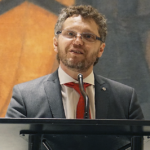Programme
2 elective credits will be recognised for attendance at the Congress
Downloadable programme
Download the full programme in PDF format.
Wednesday, 7 November
SESSION 1. AN ASSESSMENT OF INTERNATIONAL HUMAN RIGHTS LAW SINCE ITS INCEPTION UP TO THE PRESENT- 17:00 - 18:00
Registration
- 18:00 - 18:30
Inauguration
JONAN FERNANDEZ Secretary General of Human Rights, Coexistence and Cooperation of the Basque GovernmentMANUEL LEZERTUA Ombudsman of the Basque CountryProf. Dr. NEKANE BALLUERKA Rector of the University of the Basque CountryModerator: Prof. Dr. JON-M. LANDA Full Professor in Criminal Law. Director of the UNESCO Chair for Human Rights and Public Authorities. University of Basque Country  18:30 - 19:10
18:30 - 19:10Keynote Conference. Economic, Social and Cultural Rights: from aspirations to reality?
Economic, Social and Cultural Rights: from aspirations to reality?
VIRGÍNIA BRÁS GOMES The human rights vision so beautifully spelt out in the Universal Declaration of Human Rights of which we celebrate the 70th anniversary, is captured in the four freedoms – freedom of speech and expression; freedom to worship in his /her own way; freedom from fear; and freedom from want, this last freedom widely interpreted as a synthesis of economic and social rights enshrined in the International Covenant on Economic, Social and Cultural Rights. They could well be defined as everyday rights for everyday people who aspire to live with dignity. In response, States, as duty bearers, need to comply with their core and progressive realization obligations using maximum available resources. For this purpose, they need to generate resources for public policies for the enjoyment of economic, social and cultural rights and to support social transfers to mitigate inequalities that grow in times of crisis. They also need to ensure access to justice for those seeking remedies for violations of their rights. Above all they need political will to recognize and realize these rights. The world in which we live poses a number of challenges that greatly impact the realization of economic, social and cultural rights. To name just a few: • unfair distribution of the costs and benefits of globalization • economic recession, unemployment and non-standard forms of employment with negative effects on societies as a whole but in particular for women, young people, persons with disabilities, ethnic, cultural and religious minorities, and other individuals most in need of the protection of the State • the weakening of the Welfare State and the challenges of making a public/private welfare mix work for everyone, in particular the most disadvantaged • decentralization and privatization of services required to make rights effective on the ground that call for a strong monitoring role on the part of public authorities • the changing roles of women and men and the growing need for reconciliation by both of their professional, family and personal lives • the many faces of development and of mega development that have seldom led to progress and to the increased well-being of local communities, but rather to eviction, displacement and increased poverty • the need to protect rights holders from violation of their rights by third parties touching on still very debated issues like extraterritoriality • the effects of climate change and environmental degradation on the realization of ESCR that are far from being totally understood and even less integrated in public policies • the unparalleled global refugee and migration crisis that has led to the unnecessary deaths of so many men, women and children and to the physical and emotional suffering of so many others, is a permanent reminder to us all of how much we are failing to recognize and protect intrinsic human dignity • the widening of inequalities between individuals and countries and the shrinking of democratic space all over the world that we have been witnessing sound bells of alarm. We need national contexts that are more responsive to the rights of individuals, families and groups and new modalities of international cooperation based on solidarity, shared responsibility, mutual respect and complementarity. More than emerging, these are on-going challenges!VIRGÍNIA BRÁS GOMES Chair of the United Nations Committee on Economic, Social and Cultural Rights and Senior Social Policy Adviser for the Ministry of Labour, Solidarity and Social Security of Portugal 19:10 - 19:50
19:10 - 19:50Keynote Conference. The pro-person interpretation as a hermeneutic method for the application of international law
The pro-person interpretation as a hermeneutic method for the application of international law
Prof. Dr. FABIÁN SALVIOLI The role of the democratic State governed by the rule of law focuses on the respect and guarantee of human rights and fundamental liberties of all persons without discrimination, considering that the relation between democracy and human rights forms an indissoluble whole. So, the safekeeping of the rights of human beings constitutes an obligation, not an option, for States and consequently for all the powers that carry out functions within the state. National and international law on the subject represents an essential tool in the task of interpretation of public powers, and the science of human rights - rules, construction, decisions - account for a specific hermeneutic mechanism which we can identify as the pro person perspective, comprising a series of elements that interact and give mutual feedback developmentally. The first element is the central pro person (pro homine) tenet and the pro person interpretation of statutory provisions, rights, obligations of States, possible limitations, etc. Secondly, the teleological interpretation (finality) for the purposes of guaranteeing the fulfilment of the objectives provided for in human rights instruments, and of each particular regulation, highlighting the importance of carrying out the hermeneutic task at the time of application of the regulation and not as was foreseen when it was adopted. Good faith must also nurture the decision-making framework of the relevant entities, and with this perspective they must be attentive to the behaviour of the State, which should go beyond the fulfilment of obligations, achieving the correct follow-up and observance of international jurisdictional and quasi jurisdictional decisions on the subject. The pro person interpretation also requires the application of the principle of useful effect, so that regulations aimed at guaranteeing human rights have the appropriate effect, encouraging criteria of fairness, practicality and efficiency, excluding deceptive measures. Cross fertilisation, from the use of communicating channels, allows the use of interpretations and decisions of other entities to harmonise the most favourable application of the right to the human being, from the perspective of progressive development. Naturally, this requires avoiding resorting to regressive interpretations. Other principles, specific to the international right of the human being, are applied transversally in the pro person hermeneutic practice; these are: universality, indivisibility, interdependence, progressive development and the guiding principle of no discrimination. Finally, the pro person perspective is nurtured by particular and differentiated approaches when the situation so necessitates: these are gender perspective (for violations of the human rights of women, or that affect LGBTI); reasonable adjustments, universal design, accessibility, autonomy for decision-making (about the rights of people with disability); the cultural focus, free, prior and informed consent, cosmovision (for indigenous or tribal peoples), the best interest (in the case of children or adolescents); and the principle of active and healthy ageing (in cases of rights of elderly people).Prof. Dr. FABIÁN SALVIOLI UN Special Rapporteur on the promotion of truth, justice, reparation and guarantees of non-recurrence. Director of the Institute for Human Rights in the Faculty of Law and Social Sciences. National University of La Plata. Former President of the United Nations Human Rights Committee- 19:50 - 20:15
Debate
- 20:15
End of session
Thursday, 8 November
SESSION 2. THE CHALLENGE OF TERRORISM FROM THE PERSPECTIVE OF INTERNATIONAL HUMAN RIGHTS LAW- 08:00 - 09:00
Oral communications
 09:00 - 10:00
09:00 - 10:00Plenary session. Human Rights and Insecurity: can the human rights paradigm survive?
Human Rights and Insecurity: can the human rights paradigm survive?
Prof. Dr. LIORA LAZARUS Super-terrorism has ruptured the liberal consensus that underpins the international order between security and human rights. In the Global North, fear of terrorism outstrips the objective risk that it represents. Instead, it has generated a culture of risk aversion and a politics of fear. The threat of terrorist attack now constitutes the premise upon which political intolerance is legitimised. It is also the main political device through which emerging populist governments consolidate power: through hyperinflation of the threat of terrorism and exploitation of the generated fear. Illiberal governments brand human rights defenders as naïve ‘virtue signallers’, and out of touch with the ordinary fears of the population at large. In this illiberal narrative, human rights are branded as the threat to order. They are side-stepped, dismissed, elasticated and reinterpreted in pursuit of a voracious and unattainable security ideal. In a range of states in the Global South, on the other hand, terrorism is a real threat to every-day life, metastasising in weak states that lack robust rule of law and human rights structures. The existence of terrorism signals the state’s incapacity to uphold fundamental structures of security and order, but also its inability to protect and promote the human rights of ordinary citizens. Here the binary opposition between terrorism and human rights manifest through the states incapacity to protect victims and potential victims of violence. Human rights defenders in this context must face the challenge of severely under-resourced security sectors and the threats to human rights that too little security represents. The binary opposition between ‘security’ and ‘human rights’ is thus a characteristic of both strong and weak states, but they represent oppositional challenges. In strong states, rights are threatened by the state’s coercive overreach, by the pursuit of too much security. In weak states, rights are threatened by the state’s coercive under-reach, by too little security. This lecture will survey and assess the challenges of terrorism to the international human rights order from both of these perspectives. Ultimately it will question whether human rights can respond adequately to both challenges while maintaining internally coherent. In this sense, the lecture will suggest that terrorism makes human rights insecure.Prof. Dr. LIORA LAZARUS Professor in Law. University of Oxford- 10:00 - 10:30
Debate
- 10:30 - 11:00
Coffee break


 11:00 - 12:00
11:00 - 12:00ROUNDTABLE DISCUSSION
Terrorism and freedom of expression
Prof. Dr. Mª LUISA CUERDA ARNAU So-called jihadist terrorism represents a global threat to human rights from a dual perspective. On the one hand, organizations and criminal groups indiscriminately attack people and States with hitherto unknown criminal tactics. On the other hand, even the most consolidated democracies decide to tackle this new challenge with strategies which, in many cases, unacceptably defer internationally recognized rights and freedoms. This paper will address the latest penal reforms in the Spanish Criminal Code on terrorism introduced by Organic Law 2/2015. The priority objective is to demonstrate that they have been promoted from the most blatant populism, they have been implemented outside of a rigorous evaluation of their effectiveness, as well as to show that, as a whole, they reveal a deep aversion to guarantees. What is even more serious is that citizens begin to internalize that individual rights can take a back seat when speaking of national security, a disturbing and deliberately ambiguous concept in which almost everything has a place. Given this reality, it is imperative that democratic societies recover the conviction that human rights are the lifeblood of a peaceful, fair and supportive coexistence.The impending threat of Islamist terrorism and how to confront it through policing. A legal-penal analysis of the extreme hypothesis: shoot to kill
Prof. Dr. MIGUEL ÁNGEL CANO PAÑOS Islamist terrorism presents a series of characteristics that diverge enormously from traditional terrorism, of an ethno-nationalist or socio-revolutionary nature; characteristics that can be summarised in two relevant standpoints: first, the adoption by terrorists of a broad concept of enemy, with no distinction between direct or indirect victims. Second, the totally unpredictable nature of their actions which, in many cases due to their suicidal nature, make it possible to change the modus operandi in a relatively short span of time. These circumstances mean that police forces find themselves faced with an omnipresent, ubiquitous and unpredictable threat. A threat which means that the use of so-called «direct coercion» in situations of grave danger, including the use of firearms to neutralise an action which is considered exceptional, result in the destruction of human life, even if it is the presumed terrorist. Examples such as those that occurred in Catalonia in the last two years vindicate this situation. On the basis of these assumptions, the aim of the talk is to analyse, from a criminological and, especially, a legal-penal point of view, the exercise of violence by police forces to supress extremely dangerous situations in the context of the threat posed by Islamist terrorism.Prof. Dr. Mª LUISA CUERDA ARNAU Full Professor in Criminal Law. Jaume I UniversityProf. Dr. MIGUEL ÁNGEL CANO PAÑOS Full Professor in Criminal Law and Criminology. University of GranadaModerator: Prof. Dr. ADELA ASUA BATARRITA Retired Full Professor in Criminal Law. University of the Basque Country. Judge Emeritus of the Constitutional Court- 12:00 - 12:30
Debate
- 12:30
End of sessionLunch
- 12:30 - 14:30
Oral communications
Thursday, 8 November
SESSION 3. THE CHALLENGE OF DIVERSITY MANAGEMENT 14:30 - 15:30
14:30 - 15:30Plenary session. Human rights at the local level – opportunities and challenges
Human rights at the local level – opportunities and challenges
Prof. Dr. GERD OBERLEITNER Within the global process of urbanization, cities are becoming ever more important venues for promoting and protecting human rights. Local authorities have manifold human rights obligations in delivering socio-economic services, managing spaces, providing security and enabling participation in politics and culture. It is now increasingly understood that they effectively implement international human rights law in a practical way and close to the citizens, complementary (and sometimes contrary to) the respective central government. This development gives a new status to cities and local authorities as human rights actors, acting individually (e.g. as human rights cities) or in international human rights coalitions. International legal and policy frameworks have begun to notice that human rights at the local level will be one of the key themes for the coming years. Given the overall backlash against human rights, the role of cities in protecting and promoting human rights may become ever more important.Prof. Dr. GERD OBERLEITNER Professor of International Law. UNESCO Chair in Human Rights and Human Security. Director of the European Research and Training Centre for Human Rights and Democracy. University of Graz- 15:30 - 16:00
Debate
- 16:00 - 16:30
Coffee break


 16:30 - 17:30
16:30 - 17:30ROUNDTABLE DISCUSSION
Criminal law versus diversity: a programmed ambivalence
Prof. Dr. PATRICIA LAURENZO COPELLO The intense migratory movements of the last few decades, result of profound economic inequalities between regions, armed conflict and climate disasters, have accentuated the multi-cultural nature of opulent societies, giving rise to the presence in the one same geographic space of a multitude of ethnic minorities with forms of life, religion and traditions that are removed from the axiological models of the hegemonic group. It is inevitable that problems of coexistence emerge in such a complex reality, problems that require a response from public bodies, among them Penal Law. An attentive look at the criminal policy model developed in recipient countries to manage conflicts deriving from the cultural diversity expose a programmed ambiguity: on the one had minorities are protected against racist and xenophobic behaviour with the basic argument of respect for diversity; but at the same time they are stigmatised through the express criminalisation of certain traditions or rites labelled as “barbarian” and primitive. This ambivalence between protection/sanction; vulnerability/primitivism, sustains an assistential policy marked by a colonial perspective removed from the recognition of rights.Diversity and Inclusion of Mobile EU Citizens and Third-County Nationals in the EU
Prof. Dr. IRIS GOLDNER LANG The paper will discuss the European Union’s approach to dealing with mobile EU citizens and third-country nationals by examining whether, in what instances and under what conditions EU law grants them the right to reside in another EU Member State. It will be shown that there is a visible divide between EU free movement and migration policies, leading to significant differences between the rights of mobile EU citizens and third-country nationals in the EU. In this context, the paper will try to address three questions. First, why is there such a visible separation line between the EU free movement and migration policies in relation to intra-EU mobility of EU citizens and third-country nationals, knowing that the economic benefits of free movement of persons have been recognized in the EU for decades? Second, are there, nevertheless, areas where the two policies do merge? And, third, should a different approach to third-country nationals’ intra-EU mobility rights be more beneficial for their successful integration and/or for the process of EU integration?Prof. Dr. PATRICIA LAURENZO COPELLO Full Professor in Criminal Law. University of MálagaProf. Dr. IRIS GOLDNER LANG Jean Monnet Professor of European Union Law. Holder of the UNESCO Chair on Free Movement of People, Migration and Inter-Cultural Dialogue. University of ZagrebModerator: Prof. Dr. ADORACIÓN CASTRO JOVER Full Professor in Ecclesiastical Law of the State. University of the Basque Country- 17:30 - 18:00
Debate
- 18:00
End of session
- 18:00 - 19:00
Oral communications
Friday, 9 November
SESSION 4. THE CHALLENGE OF REFUGEES- 08:00 - 09:00
Oral communications
 09:00 - 10:00
09:00 - 10:00Plenary session
The protection of refugees: a shared responsibility in line with the Global Compact on Refugees
MARÍA JESÚS VEGA PASCUAL Three years after the appalling images of bodies floating in the Mediterranean and boats reaching the Greek Islands with tens of thousands of refugees and immigrants, arrivals in Europe have considerably reduced but not so the number of men, women and children who continue to drown daily attempting to reach the continent. In spite of this, in Europe we see with apprehension a reduction in the area of protection, more restrictive legislative changes towards people fleeing from war and persecution and a growing political discourse that instils fear, distrust and hate towards the “Others” when the priority of politicians should be to encourage and strengthen coexistence and a favourable environment to welcome and integrate those persons, not present them as a threat. With concern we see how these crises are deteriorating the capacity and moral authority of States in defending Human Rights and how policies lean towards approaches that are exclusively to do with border control and security. While in Europe the debate focuses on who accepts the least number of refugees, worldwide for the 5th year running we have reached a new record of forcibly displaced persons, exceeding 68.5 million. 85% of refugees are being hosted in disadvantaged or developing countries. The World Compact of Refugees which will be adopted at the end of 2018 and which will be a historic milestone, will offer States a new opportunity to respond to situations of refugees in a more equitable, efficient and predictable way, involving multiple agents.MARÍA JESÚS VEGA PASCUAL Spokesperson and communications manager for UNHCR in Spain- 10:00 - 10:30
Debate
- 10:30 - 11:00
Coffee break


 11:00 - 12:00
11:00 - 12:00ROUNDTABLE DISCUSSION
The unsatisfactory action of the European Union on matters of immigration and asylum
Prof. Dr. JOSÉ MARTÍN Y PÉREZ DE NANCLARES The unsatisfactory action of the European Union on matters of immigration and asylum, outlining the main weaknesses. The founding treaties of the European Union confer on the institutions of the Union a shared competence (shared with the States) to deploy a common policy on matters of immigration and asylum (arts. 77 to 80 TFUE). However, on analysing the European actions undertaken to date, insufficient action by the Union is evident, at the same time as leaning towards security at the expense of freedom and justice which should equally and inseparably shape the so-called Space of Freedom, Security and Justice. Serious doubts also emerge with regard to the effective fulfilment of values and principles which are the basis of the European integration process. Particular attention needs to the given to analysing certain instruments of the external action of the Union, for example, the agreement reached with Turkey in 2016, which raises very serious legal doubts about its compatibility with the legal obligations of international law assumed by the EU and by all the member States, for example the obligations derived from the Geneva Convention on the Status of Refugees of 28 July 1951. Significant legal doubts also arise in relation to the compatibility of the worrying developments that are taking place in the Mediterranean with the compliance of regulations of the International Law of the Sea, for example on maritime rescue and assistance to the shipwrecked.Human Rights at the “Southern Border”
Prof. Dr. MARGARITA MARTÍNEZ ESCAMILLA If one of the best means of evidencing the quality of our democracy and the rule of law upon which it is based is the way we treat migrants and refugees then a look at our borders should fill us with horror. In some cases, when States “manage” irregular immigration they take action under the protection of regulations that limit terribly the rights of migrants. In others States simply flout the rules they are supposed to respect and guarantee and commit human rights violations. A flagrant example of this is what are known as “devoluciones en caliente” (summary returns), a practice that has been used for years on our southern border (Ceuta and Melilla) The 3rd October 2017 judgement of the European Court of Human Rights (ND and NT against Spain) declared these practices as contravening the European Convention. The socialist government has maintained the request made by the previous government to have the ruling returned to the Grand Chamber. On writing this abstract the ruling is not considered a final judgement, something that is essential if the human rights of migrants and refugees are to be protected. In the meantime we have witnessed the enforcement of the 1992 Readmission Agreement between Spain and Morocco, which had previously practically gone un-used because of Morocco’s opposition. If this becomes standard practice, yet another questionable scenario for human rights observance will open before us. We have every reason to be sceptical about the rights of people on the move being respected. What is more, faced with States complete lack of interest in protecting said rights and the fact that these rights are conditioned by the person’s physical presence in the territory, an all out effort is being made to close borders. Fortress Europe is not a metaphor but a bloody reality, which has turned the Mediterranean into the biggest cemetery in the world.Prof. Dr. JOSÉ MARTÍN Y PÉREZ DE NANCLARES Full Professor in International Public Law and International Relations. University of SalamancaProf. Dr. MARGARITA MARTÍNEZ ESCAMILLA Full Professor in Criminal Law. Principal R+D+I Researcher of the Iusmigrante Project. Complutense University of MadridModerator: Prof. Dr. MARÍA DOLORES BOLLO AROCENA Full Professor of International Law. University of the Basque Country- 12:00 - 12:30
Debate
- 12:30
End of sessionLunch
Pausa comida - 12:30 - 13:30
Oral communications
Friday, 9 November
SESSION 5. THE FUTURE OF HUMAN RIGHTS
 14:30 - 15:55
14:30 - 15:55Closing Conference
DebateESTEBAN BELTRÁN VERDES What we have called “demonization policy” poses a serious challange, possibly an existential threat to the whole project of human rights, as cooperation and international norms lose support and increasingly more governments openly express themselves as hostile to human rights, often with the support of public opinion. Demonization speeches are increasingly more evident, more extended and more popular. Certain conditions exist that are systematically taken advantage of to promote demonization policies. Inequality is increasing in many parts of the world, as is the perception of cultural displacement, and politicians take advantage of this sitaution making use of simplified discourse that identify scapegoats to blame for causing a popular sensation of discontent, often migrant people or other minorities. Hate and fear have passed from being rhetoric to being reality, as many governments have attempted to apply policies that standardise large-scale discrimination of minorities and marginalised groups. With few leaders prepared to stand in defense of human rights in the world scenario, governments are removing without any shame guarantees of human rights protections which has taken a lot of effort to obtain. Faced with this situation, people are mobilising because governments do not satisfy their basic needs, especially in matters of housing, work and economic rights. The alarming increase in inequality is creating an ideal climate for the exacerbation of the social division, resulting in an increased risk of human rights violations. By denying these human rights, governments are provoking the most absolute desperation. The enormous social and economic difficulties, such as austerity, physical abuse and the lack of government solutions to these problems, could provoke a human rights disaster that would affect millions of people. An example of this is that, in Europe, citizens took to the street to protest against the harmful effects of the austerity measures in Spain, Greece, UK and Serbia. Research carried out in England listed around 120,000 deaths from the cuts in health care and social services During 2017 there were considerable cuts in public spending in Indonesia, Mongolia and Sri Lanka. As we approach the 70th anniversary of the Universal Declaration of Human Rights in December 2018, the challenge facing us is obvious. The time has come to recover the essential idea of the equality and dignity of all persons, of appreciating these values and demanding that they become the basis of policy formulation and its application. Governments must give priority to human rights both nationally and internationally. With outstanding leaders attempting to undermine fundamental liberties, and war crimes against humanity ignored, the lack of leadership on matters of human rights on a global scale has had dangerous consequences. Raising your voice has become increasingly more dangerous, and governments must invert this tendency if we want to protect our valued right to freedom of expression. Attacks against the mass media have reached unprecedented extremes, as has happened with attacks against human rights activists. Societies can only flourish if they are prepared to scrutinise those in power, rather than refraining from doing so.ESTEBAN BELTRÁN VERDES Director of Amnesty International SpainJEROEN SCHOKKENBROEK Director of Anti-Discrimination. Directorate General of Democracy. Council of Europe- 16:00 - 16:45
Report and Prize awarding for the Oral Communications
Prof. Dr. PATXI JUARISTI Vice Rector of the Bizkaia Campus. University of Basque CountryIÑIGO URKULLU President of the Basque GovernmentModerator: Prof. Dr. JON-M. LANDA Full Professor in Criminal Law. Director of the UNESCO Chair for Human Rights and Public Authorities. University of Basque Country - 16:45
End of session



